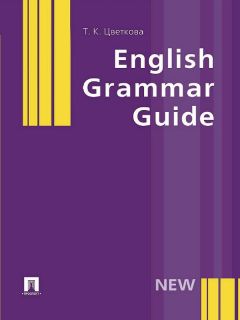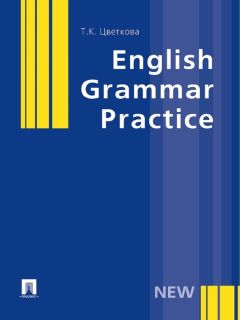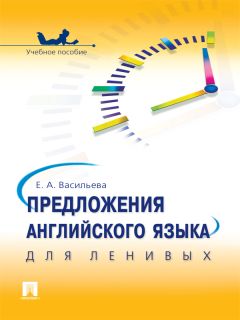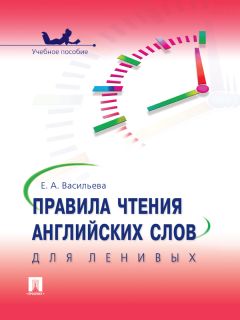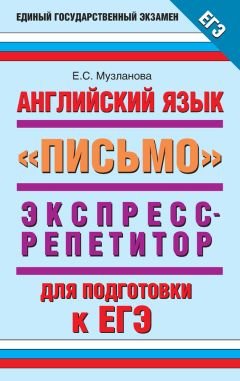Елена Васильева - English grammar: 100 main rules
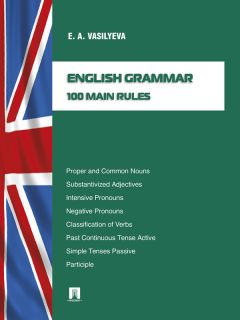
Все авторские права соблюдены. Напишите нам, если Вы не согласны.
Описание книги "English grammar: 100 main rules"
Описание и краткое содержание "English grammar: 100 main rules" читать бесплатно онлайн.
As soon as you started learning English you have to study basic grammar rules that help understand the language structure and as a result communicate effectively. In the reference guide 100 most common grammar rules are put together and explained in a clear form of tables with several examples to each rule. Referring to this grammar guide may be helpful for those students who have recently started learning English and still find grammar not simple to understand as well as for those advanced users who need just refresh their knowledge of English grammar or clarify some grammar points.
1. Attribute
We liked that warm meeting.
I hear some pleasant music.
Note
There is a particular order for adjectives to describe a noun.
Opinion – Size – Shape – Colour – Pattern – Age
– Origin – Material – Purpose + Noun
a clever young British professor
two nice tiny round black old metal musical boxes
that beautiful swift white new sailing boat
2. Predicate
The meeting was warm.
Your mother looks sad.
I feel good about the offer.
A predicate adjective follows a linking verb (to be, to seem, to appear, to look, to taste, to smell, to feel, to sound), but it refers to the subject of the sentence.
3. Subject and Object (Substantivized adjectives)
The unemployed demanded concrete programs of public works.
The young should help the old.
RULE 12. Cardinal and Ordinal NumeralsRULE 13. Fractional Numerals. Operations with Numerals
Fractional Numerals
Common fraction
The numerator is a cardinal number; the denominator is an ordinal number.
1/2 – one (a) half
1/3 – one (a) third
1/4 – one (a) quarter
1/5 – one (a) fifth
1/6 – one (a) sixth
If the numenator is more than one, then the denominator is used in plural.
2/3 – two thirds
3/4 – three quarters
5/6 – five sixths
Decimal fraction
Each digit is pronounced separately.
25. 105 – two five point one nought five
0.746 – nought point seven four six
Operations with Numerals
1. Addition
1+2=3 – one plus two is (equals) three; 1, 2 – the addends, 3 – the sum
2. Subtraction
3–2=1 – three minus two is (makes) one; 3 – the minuend, 2 – the subtrahend, 1 – the difference
3. Multiplication
3*2=6 – three multiplied by two/twice three is six; 3 – the multiplicand, 2 – the multiplier, 6 – the product
4. Division
6:2=3 – six divided by two is three; 6 – the dividend, 2 – the divisor, 3 – the quotient
RULE 14. Numerals for Time ExpressionsRULE 15. Syntactical Functions of NumeralsSyntactical Functions of Numerals
1. Attribute
Do you know the seven wonders? This is Andrew's third trip abroad.
2. Subject
Four of them didn't join us.
2004, 2008 and 2012 are leap years.
3. Predicative
They were the first.
It's five o'clock.
4. Object
How many apples has he eaten? He's eaten three.
Show me those two, please.
RULE 16. Personal PronounsRULE 17. Possessive PronounsRULE 18. Absolute Form of Possessive PronounsRULE 19. Reflexive PronounsRULE 20. Intensive PronounsNote
Intensive pronouns do not substitute nouns, but intensify their meaning.
You must make that choice yourself.
Andrew repaired the bike himself.
We want to go there ourselves.
RULE 21. Demonstrative PronounsDemonstrative Pronouns
Demonstrative pronouns point to a certain object or person that can be either near or far in distance or time.
Note
1) Attribute
This situation is incredible.
We met that man on the station.
Would you quit your job under these circumstances?
Those shoes were so cute!
That girl has such a voice!
Such rules usually take effect.
They work at the same department.
Why are you asking me the very same questions?
It's possible to use demonstrative pronouns before the word one.
These apples are sweeter than those ones.
Andrew is an intelligent young man. Yes, he is such one.
That's the same one I've been looking for!
The demostrative pronoun may be positioned before the adjective that refers to the same noun.
This pretty girl is my sister.
What are these strange conclusions?
It's such a wonderful life.
It's always the same old story.
2) The demonstrative pronoun can also be used in place of nouns.
– Subject
This must not continue.
Those were the days.
– Object
Will you take this?
Don't tell them that.
Andrew can't work with those.
RULE 22. Classification of Indefinite PronounsRULE 23. Some, Any and their Compoundssome
– statements
I need some information about language courses.
Some of the m istakes were silly.
– offers and suggestions
Would you like some tea?
Shall I bring some refreshments?
– requests
Where can I get some paper?
Could you give us some examples?
any
– negative sentences
Olivia didn't know any of them.
It doesn't make any sense.
– questions
Have you got any questions?
Did any of Andrew's friends call him?
– if-clauses
I can lend her my cell phone if there's any need.
If you come across any problems, please, report us.
– statements
Contact any of our assistants.
Any answer will do.
Somebody phoned you ten minutes ago.
Would you like something to eat?
Can we take something to make notes on?
You may invite anyone.
Are they waiting for anybody?
Andrew has not found anything.
RULE 24. Each, Every, Eithereach
– only with countable nouns
– refers to two or more things or persons that should be regarded separately and individually
There were cars parked on each side of the street.
She kissed each of her children.
– agrees with a singular verb
There are four apartments in our building. Each of the apartments has its private entrance.
Each item was checked.
– However, if the pronoun each follows the plural subject, it agrees with the plural verb.
They each do their share of work.
I have two people in the office and we each have our own email.
every
– only with countable nouns
– refers either to indefinite number of things/persons or to a group of things/persons considered as a whole.
We could see every star in the night sky.
Every player in the team should cooperate.
– with modifiers such as nearly, almost, practically
Olivia knows almost every neighbour.
Practically every problem has practical solutions.
– with time words such as minute, hour, day
There's a bus every ten minutes.
Every morning Andrew goes jogging in the park.
– makes compound pronouns with – body, – one, – thing
Everybody likes presents.
They invited everyone but James and Karen.
Everything's done by computer nowadays.
Note
the pronoun everyone differs from the word combination every one.
Everyone is a synonym to everybody and refers only to persons.
Everyone enjoyed the movie.
Every one is a synonym to each one and refers both to persons and things.
He watched a lot of movies and enjoyed every one.
– agrees with singular verb
Every citizen is obliged to observe the constitution.
Each and every one of us has their own opinion.
either
– with countable nouns
– refers to two or more things or persons
There are shops at either end of the street.
Either of these books is useful.
Nick can wear watches on either hand.
Note
the pronoun either differs from the adverb either, which is used in negative sentences.
If you don't order the dessert, I won't either.
Подписывайтесь на наши страницы в социальных сетях.
Будьте в курсе последних книжных новинок, комментируйте, обсуждайте. Мы ждём Вас!
Похожие книги на "English grammar: 100 main rules"
Книги похожие на "English grammar: 100 main rules" читать онлайн или скачать бесплатно полные версии.
Мы рекомендуем Вам зарегистрироваться либо войти на сайт под своим именем.
Отзывы о "Елена Васильева - English grammar: 100 main rules"
Отзывы читателей о книге "English grammar: 100 main rules", комментарии и мнения людей о произведении.







